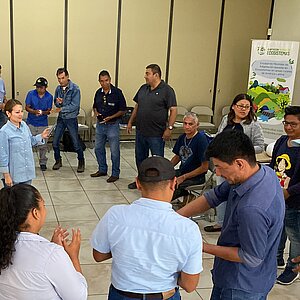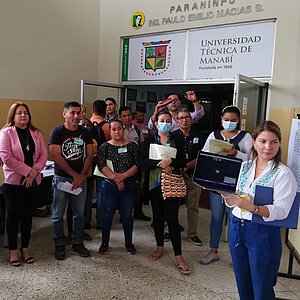Scaling-up Ecosystem-based adaptation (EbA) measures in rural Latin America
Latin American countries are severely affected by impacts of climate change and associated extreme weather events. The project increases the resilience of vulnerable communities and ecosystems in rural areas of the partner countries. To this end, it develops and implements proven, innovative and cost-effective EbA approaches in different ecosystems. It also strengthens the capacity of a wide range of actors, including national and local government and civil society organisations, the private sector, service providers and rural communities. It also embeds EbA practices into the revised NDCs, sectoral plans and national adaptation plans to better achieve national adaptation goals. The project ensures long-term impact in partner countries through, among other things, the (further) development of innovative financial instruments and products, improved governance and knowledge exchange.
- Countries
- Costa Rica, Ecuador, Guatemala
- IKI funding
- 20,000,000.00 €
- Included preparation phase
- 516,929.90 €
- Duration
- 11/2020 till 07/2026
- Status
- open
- Implementing organisation
- Deutsche Gesellschaft für Internationale Zusammenarbeit (GIZ) GmbH
- Political Partner
-
- Diverse climate change relevant institutions in the respective partner countries/Diverse klimarelevante Institutionen in den entsprechenden Partnerländern
- Ministry of Environment, Water and Ecological Transition (MAATE) – Ecuador
- Ministry of Environment and Energy (MINAE) - Costa Rica
- Ministry of Environment and Natural Resources (MARN) - Guatemala
- Implementing Partner
-
- ALTERNA
- International Institute for Sustainable Development (IISD)
- International Union for Conservation of Nature and Natural Resources (IUCN) – Regional Office for Mexico, Central America and the Caribbean (ORMACC)
- MAQUITA
- Tropical Agricultural Research and Higher Education Center (CATIE) - Costa Rica
- UNEP World Conservation Monitoring Centre (WCMC)
- Universidad Rafael Landívar - URL
- Online
State of implementation/results
- Costa Rica, Ecuador and Guatemala:
- EbA approaches have been successfully integrated into national and subnational planning instruments.
- In July 2025, the e-learning course "Financing for Adaptation and Resilience to Climate Change in Latin America”, a key milestone in strengthening capacities within the finance and insurance sector, was launched. The objective of the course is to raise awareness among professionals in the financial sector on the importance of identifying and managing the risks and opportunities that climate change represents for the banking and insurance sector. It aims to enhance the transformative role they can play in transforming climate risk into sustainable business opportunities.
- EbA measures ranging from ecosystem restoration, agroforestry, silvopastoral approaches, and sustainable forest management have been implemented on more than 15,500 ha benefitting more than 16,100 vulnerable land users. 4,900 people were supported in addressing climate change and conserving biodiversity through networking and training. So far, 3,5 million EUR were leveraged from public and private sector to scale up EbA.
- In November 2024 key representatives from regulatory authorities, the insurance sector and relevant ministries from Bolivia, Brazil, Costa Rica, Ecuador, and Guatemala met in Quito to discuss the future of climate risk insurance and led to the identification of proposals to advance climate risk insurances in Latin America.
- The Costa Rican Development Bank System (SBD) has established special credit programs to scale up EbA in the agricultural, livestock (10 Mio USD), and tourism (2 Mio USD) sectors.
- With support of the project, communities and government authorities of the rural canton Pococí have created the new Biological Corridors “La Suerte”, which enhances hydrologic connectivity between the Caribbean wetlands, Tortuguero National Park and the protected wildlife area Acuíferos Guácimo-Pococí.
- Guidance material on Sustainable Watershed Management has been released for municipal planners promoting EbA measures which enhance water security.
- The National Development Bank launched a Water Security Program aiming to finance water security investments and sustainable watershed management.
- Increase and facilitate access to finance to promote sustainable businesses and improve the income for families in the most climate-vulnerable rural communities in Manabí is the objective of a project promoted by the local organization Maquita and EbA LAC. Four local bank cooperatives were recognized for working on their green credit products and received funding from the Savings and Loan Cooperative Financoop.
- 81 promoters of the Executive Coordination Secretariat of the Presidency of the Republic of Guatemala were engaged in promoting up EbA in urban and rural Development Councils.
- 32 small and medium sized enterprises (SME) developed business models that integrate EbA.
- The National Forest Institute issued a resolution on regulating the credit guarantee program for forest activities. It aims to absorb risks, encourage long-term investment in sustainable forest management, and is an important step for SMEs to access credit loans for reforestation and agroforestry activities, supporting economic development in rural areas.
- More than 100 participants attended the training on “Technical and Financial Tools for Forest Restoration and EbA”.
- From July to September 75 representatives from public, private, and civil society participated in Climate Finance training, aimed at strengthening knowledge in managing and accessing international climate funds.
- To promote leadership in scaling-up EbA, the governor of Chimaltenango and 16 mayors were engaged in an exchange on benefits of EbA. In Quiché and Baja Verapaz, indigenous mayors were empowered to take leadership on EbA through the facilitation of decision-making tools for effective territorial governance.
Latest Update:
12/2025
Further links
- Factsheet of the project
- Video: Rodolfo Segura - Emprendedor Adapt-Activa (ES)
- Video: EbA LAC - Ecuador
- Video: Necesitamos actuar juntos YA: Estrategia AbE (ES)
- Video: Necesitamos actuar juntos YA: personas se preparan para enfrentar el cambio climático con AbE (ES)
- Video: ¿Qué son las medidas de adaptación basadas en ecosistemas? – Guatemala (ES)
- Video: Historias de mujeres realizan acciones adaptación al cambio climático (ES)
- Video: Dive into biological corridors and agro landscape: Immersive Experience (ES)
- Article: Shifting from conservation to a comprehensive approach - Biological Corridors as an effective solution to scaling up EbA measures
- Article: Seeding success: Sustainable Financing for Climate-Resilient and Biodiversity-Positive Startups in Rural Communities
- Article: Scaling-up EbA in rural Latin America: Success factors and impacts
- Guide: Programme to strengthen sustainable financing and implementation of EbA measures (ES)
- Guide: Sustainable Watershed Management: Practical Guide for Developing Projects with an Ecosystem-based Approach to Climate Change Adaptation (ES)
- Video: Comunidades buscan financiamiento para enfrentar el cambio climático (ES)
- Video: Entidades publicas y privadas buscan soluciones financieras centradas en las finanzas verdes (ES)
Project relations
Legend:
The link has been copied to the clipboard
Related Publications
-

-
 08/ 2024 | IKI Evaluation
08/ 2024 | IKI EvaluationExecutive Summary for the Mid-Term Evaluation “Scaling-up Ecosystem based Adaptation (EbA) Measures in Rural Latin America”
English (PDF, 322 KB, barrier-free)
German (PDF, 283 KB, barrier-free)
Spanish (PDF, 287 KB, barrier-free)
Follow-up of MTE recommendations by the project consortium (PDF, 162 KB, barrier-free)



















